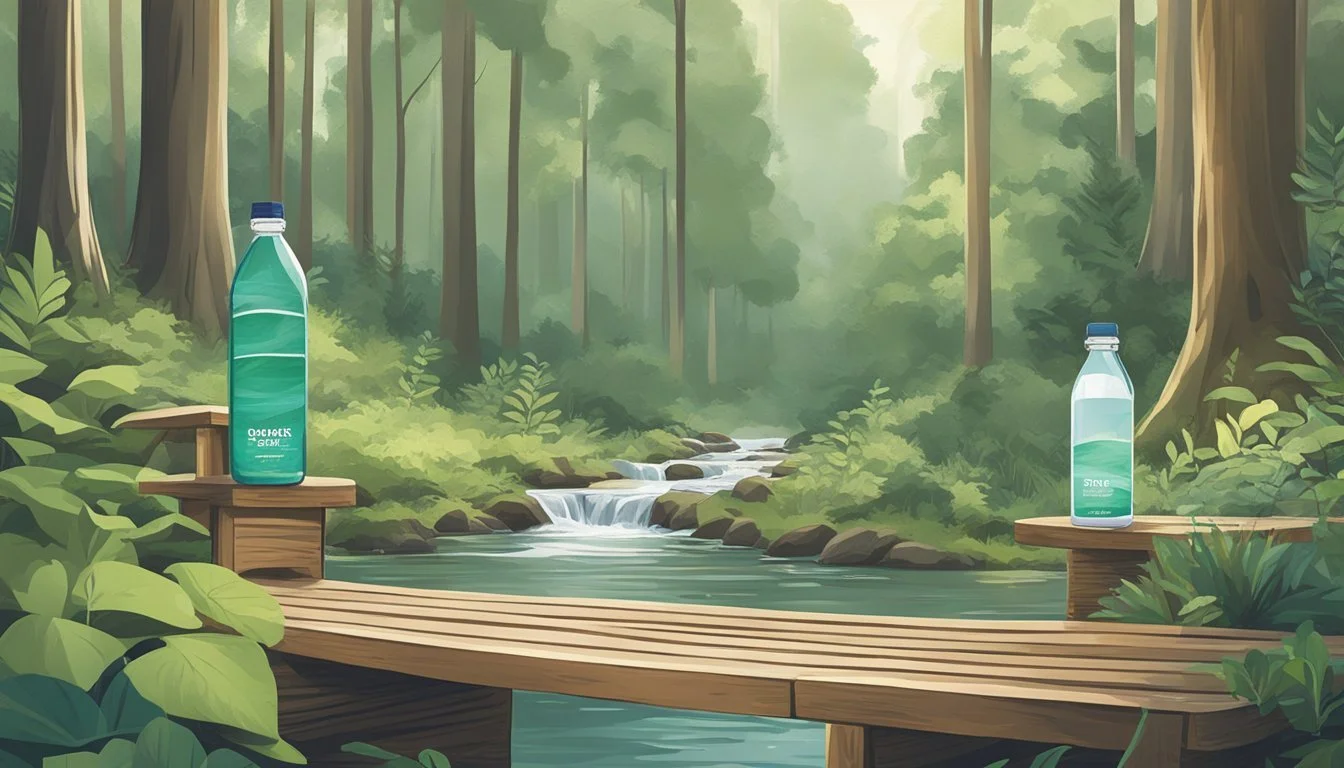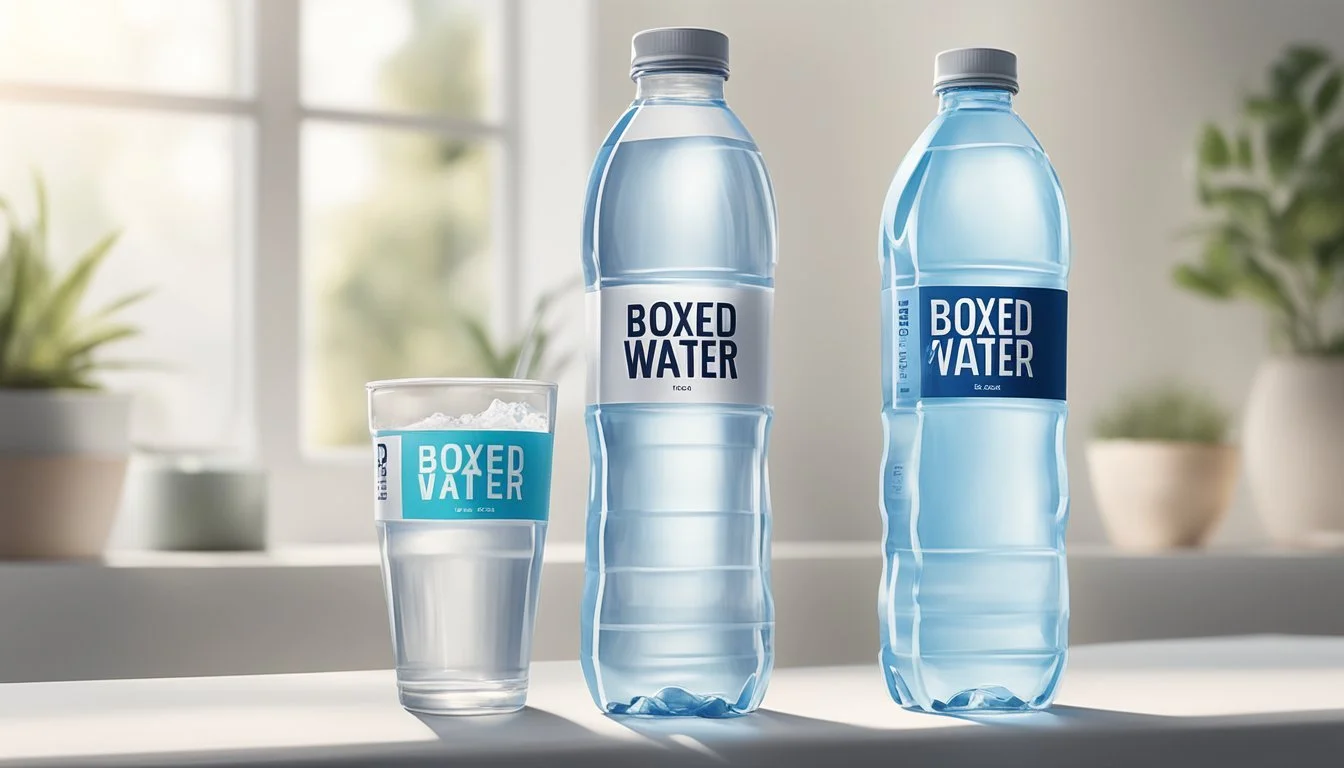Boxed Water vs. Essentia
Comparing the Benefits for Eco-Conscious Hydration
In the ever-evolving landscape of consumer water choices, two contenders stand out for their distinct approaches to hydration: Boxed Water and Essentia. Boxed Water has carved out a niche for itself with a focus on environmental sustainability, offering a packaging solution primarily consisting of paper, with a mix of aluminum and plastic to ensure waterproofing. This design is aimed at reducing the reliance on single-use plastics, a move that resonates with eco-conscious consumers.
Essentia, on the other hand, touts its ionized alkaline water with a high pH level of 9.5, with the promise of zero traces of acidity. This quality targets consumers looking for potential health benefits, such as improved hydration and balance in the body's pH levels. Both brands challenge the status quo of bottled water, yet their appeal hinges on different values: one champions environmental responsibility, while the other emphasizes personal health enhancements.
Choosing between Boxed Water and Essentia is not just a matter of quenching thirst—it's a decision influenced by a consumer's priorities whether they lean towards environmental impact or the pursuit of health and wellbeing. As the market for bottled water becomes increasingly segmented, these brands highlight the diverse considerations that go into selecting the right water to meet individual needs and values.
Understanding Bottled Water
When it comes to bottled water, consumers should consider the variety of types available, industry practices, and the significant environmental implications of their choices.
Types of Bottled Water
Bottled water comes in many forms, each with its own sourcing and purification process. Types include:
Mountain Spring Water: Originates from natural springs and often contains naturally occurring minerals.
Alkaline Water: Has a higher pH level than tap water and is believed by some to offer health benefits due to its mineral content.
Ionized Water: Water that has been ionized, meaning the pH level has been increased through electrolysis.
Purified Water: Treated by processes such as reverse osmosis, distillation, or carbon filtration to remove impurities.
Mineral Water: Groundwater that naturally contains at least 250 parts per million of total dissolved solids, including minerals and trace elements.
The Bottled Water Industry
The bottled water industry includes numerous brands, such as Dasani, Poland Spring, Fiji, and Evian, each promoting its own source and purification methods. Companies are navigating a market that demands not just hydration but also added health benefits, like electrolytes or increased alkalinity. The use of terms such as 'pure life,' 'eternal water,' and 'Icelandic glacial' often reflect marketing strategies rather than the product’s inherent quality.
Environmental Considerations
The environmental impact of bottled water is a growing concern. Factors include:
Material Use: Bottles made from plastics consume oil in their production and contribute to global plastic waste if not properly recycled. Paper-based packaging like Boxed Water™ represents a shift toward sustainability, claiming a lower carbon footprint and being mostly recyclable.
Recyclability: While some bottles are 100% recyclable, actual recycling rates may vary, and many end up as litter or in landfills. Carton recycling availability can affect the overall environmental friendliness of boxed water options.
Single-Use vs. Reusable: Single-use plastic bottles remain a major environmental threat. Reusable water bottles offer a more sustainable, long-term alternative.
'Greenwashing' Malpractices: Some companies may engage in 'greenwashing,' making products seem more eco-friendly than they are. It is critical for eco-conscious consumers to discern genuine sustainability efforts from marketing ploys.
Consumers are increasingly encouraged to opt for products from companies that prioritize reducing their environmental footprint and employ eco-friendly practices.
Boxed Water vs. Essentia
In this comparison, the focus is on two distinctive water brands: Boxed Water is Better, known for its paper-based packaging and sustainable approach, and Essentia, recognized for its ionized alkaline water. Each has unique features from packaging to the water quality they offer.
Boxed Water Overview
Boxed Water, launched in 2009, emphasizes eco-friendliness with its carton-based design, which is 100% recyclable. Sourced from municipal sources, the water undergoes purification before being boxed.
Essentia Water Overview
Essentia, on the other hand, takes pride in its high pH levels that come from its proprietary ionization process. Their product not only includes purified water but also a blend of electrolytes for taste.
Packaging and Sustainability
Boxed Water packaging primarily consists of paper, using 74% paper, 25% plastic, and 1% aluminum. The company is part of a carton recycling program, aiming to be the sustainable alternative to single-use plastic bottles.
Essentia bottles are 100% recyclable, catering to consumers looking for environmentally friendly options. However, they are still plastic, which can be a concern in comparison to Boxed Water’s mainly paper-based solution.
Taste and Quality of Water
Boxed Water offers purified tap water without additional minerals for flavor. It aims for a neutral taste profile.
Essentia undergoes a purification process known as reverse osmosis and then enhances the water with electrolytes and minerals, resulting in a smooth taste. They emphasize their high pH, which can contribute to the taste experienced by consumers.
Health and Safety Considerations
Boxed Water's purification removes impurities and contaminants, making it a safe option. Essentia also ensures safety through its purification process, and the added electrolytes can benefit hydration.
Price and Accessibility
Boxed Water is often seen as a premium product due to its unique packaging and can be more expensive than traditional bottled water. Available in supermarkets and online, it is targeted at a domestic market interested in sustainable choices.
Essentia is also widely available and can be marginally more expensive than average bottled water due to its added electrolytes and the process it undergoes to achieve high pH levels. Both brands are accessible to consumers seeking premium water on the go.
Environmental and Social Responsibility
When assessing the performance of Boxed Water and Essentia in terms of environmental and social responsibility, one must consider their commitments to sustainability, the environmental impact of their water source and production processes, as well as their initiatives and collaborations within the industry.
Corporate Commitments to Sustainability
Boxed Water has made sustainability a cornerstone of its brand identity. Its packaging, made substantially from paper, is marketed as a more sustainable alternative to plastic bottles. Boxed Water's cartons comprise 74% paper and are said to be recyclable, aligning with the company's eco-friendly ethos. On the other hand, Essentia focuses on recycling and reducing carbon footprint. Essentia's bottles are made from PET-1 plastic, which they claim is also recyclable. Both companies recognize the necessity of reducing environmental impact, but they approach it with different models.
Impact of Water Source and Production
The impact of water sourcing is pivotal in the conversation about sustainability. Essentia uses municipal water sources which it further purifies. This may help minimize the environmental impact typically associated with extracting groundwater. Boxed Water partners with organizations like the National Forest Foundation and 1% for the Planet, emphasizing not only its packaging but its commitment to replenishing the environment. These partnerships point to an awareness of the broader environmental implications of water production.
Initiatives and Collaboration
Both Boxed Water and Essentia engage in several initiatives to showcase their commitment to environmental stewardship. For instance, Boxed Water has collaborated with Alaska Airlines to replace single-use plastic water bottles on select flights. This initiative highlights a growing trend of aligning with larger companies to expand eco-friendly solutions. Essentia, meanwhile, has focused more on promoting individual change, encouraging consumers to opt for reusable water bottles when possible to decrease overall waste. By facilitating the shift to more sustainable consumption habits, Essentia contributes to the broader movement against single-use plastics.
Consumer Choices and Trends
In the evolving marketplace, personal values and environmental concerns are significantly influencing consumer choices, especially when it comes to selecting water brands like Boxed Water and Essentia.
Shift in Consumer Preferences
Consumers increasingly prioritize sustainability and eco-friendly practices in their purchasing decisions. Boxed Water appeals to this trend with its 92% plant-based packaging, tapping into the demand for environmentally friendly products. On the other hand, Essentia focuses on providing a product that emphasizes personal energy, with its ionized alkaline water that is marketed towards health-conscious individuals. The shift towards products that are both beneficial for personal health and the environment can be particularly seen in the rise of reusable water bottles, as they offer a solution that addresses both individual wellness and ecological impact.
The Role of Marketing
Marketing plays a pivotal role in shaping the public's perception of water brands. Essentia highlights its purification process and added electrolytes, aiming to resonate with consumers looking for performance enhancement. Meanwhile, Boxed Water leverages its sustainable packaging as a key marketing point to align with the values of eco-conscious consumers. Both brands must navigate the fine line between genuine environmentally friendly practices and greenwashing. Consumers are becoming savvier, seeking out facts to substantiate brands' eco-friendly claims.
By focusing on the unique selling points that resonate with their target consumers, each brand carves out a distinct niche in the competitive bottled water market.
The Bottom Line
When consumers are making a choice between Boxed Water and Essentia bottled water, they weigh several factors: health, taste, and sustainability.
Boxed Water emphasizes sustainability with its paper-based packaging, which can be a significant draw for environmentally conscious customers. It reduces reliance on plastic, though it is not plastic-free since a small amount of plastic is still used. However, availability of carton recycling plays a critical role in the environmental impact of such products.
Essentia, on the other hand, markets itself as ionized alkaline water, which means it offers a different health angle. Some people prefer Essentia for its potential health benefits such as better hydration due to its higher pH level and the presence of electrolytes for taste enhancement.
In terms of taste, this can be subjective but is still a deciding factor for many. Boxed Water’s taste is influenced by its minimal processing and packaging materials. Essentia touts a smooth taste contributed by its ionization process and mineral content.
Here’s a quick comparison for clarity:
Aspect Boxed Water Essentia Sustainability Paper-based, partially plastic Plastic bottles Health Minimal processing Ionized, alkaline, electrolytes Taste Influenced by packaging Smooth, with minerals
Buyers must decide which attributes align best with their priorities. If sustainability is the highest priority, Boxed Water might be the preferable option, provided that appropriate recycling options are available. For those focused on health and a specific taste profile, Essentia might be the better choice. Each brand offers distinct benefits, and the final decision rests with individual consumer values and needs.
Conclusion
When comparing Boxed Water and Essentia, consumers often weigh factors such as sustainability and environmental impact. Boxed Water, with its paper-based packaging, is designed to lessen plastic usage; the cartons are composed of 74% paper, 1% aluminum, and 25% plastic to maintain integrity and waterproof properties.
Essentia water stands out for its alkaline properties and claims of additional health benefits. It is bottled, typically in plastic, which has a different environmental footprint. While the health advantages of alkaline water require further research, hydration remains essential for health.
Environmental Consideration Boxed Water Essentia Water Packaging Material Mostly Paper Plastic Recyclability Higher Varies Sustainable Practices Yes Not Specified
In terms of sustainability, Boxed Water may be the preferred choice as it aims to disrupt the traditional bottled water market with eco-friendlier options. However, consumer preference can also be influenced by taste and perceived health benefits, where Essentia could have an edge for some.
Ultimately, both brands offer unique features that resonate differently with each individual's values and preferences. One's choice may lean towards the environmental ethos of Boxed Water, or the specialized attributes of Essentia water. The decision should align with the consumer's personal commitment to sustainability and health considerations.




